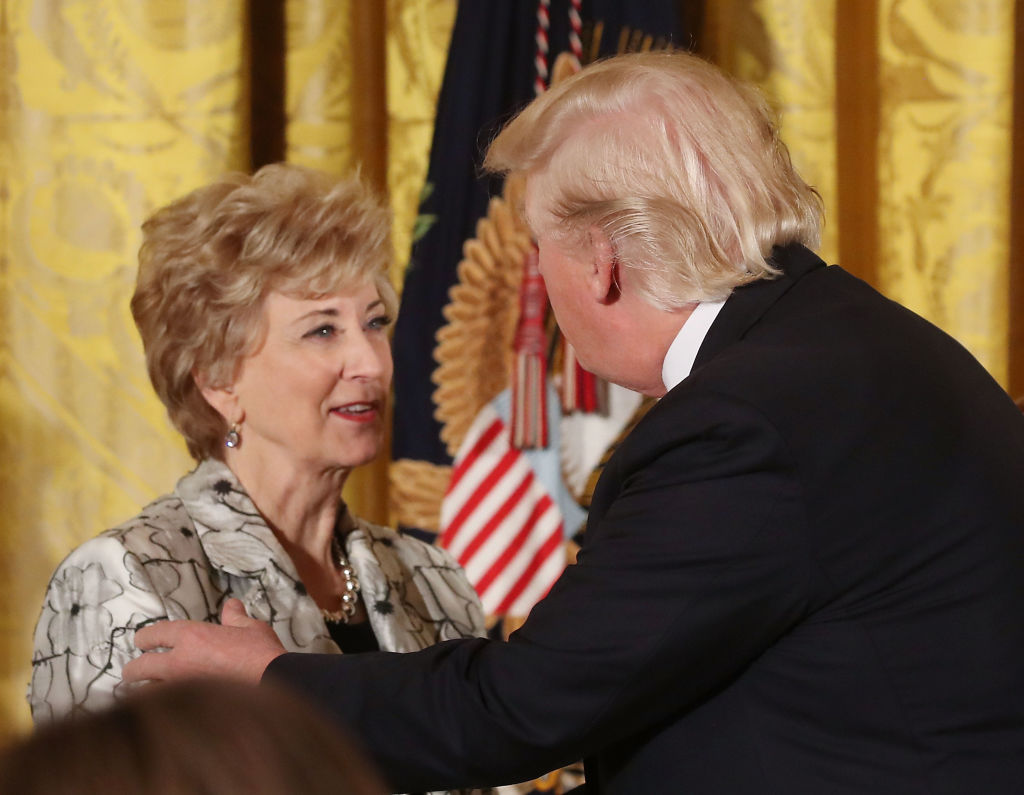From fighting DEI to outright abolishing the Department of Education (ED), President-elect Donald Trump has made audacious promises to change education. And with the appointment of former World Wrestling Entertainment (WWE) executive Linda McMahon as Education Secretary, what can we expect from this outsider?
McMahon co-founded the WWE and led the Small Business Administration during Trump’s first term. Although she has dabbled in education issues, expressing support for school choice and serving on the Connecticut Board of Education, McMahon will for the most part begin with a fresh set of eyes unbeholden to the interest of the education establishment. Her background suggests she will treat the ED as a business, focusing on reducing waste and inefficiencies.
McMahon faces a long road ahead to implement Trump’s desired reforms. While there are certain things the administration can pull off easily through executive action, reducing the ED’s budget and abolishing it entirely will require Congressional approval. This means that much will depend on the cooperation of the Republican-controlled House and Senate. With relatively narrow majorities in both houses of Congress, the Trump administration may face some difficulties accomplishing its more ambitious goals for the ED.
But the Trump administration can still score some big wins. For example, it could overturn the Biden administration’s executive orders on education, including policies on LGBT discrimination, which included a controversial decision to expand sex discrimination rules to include gender identity. Trump campaigned heavily against mandatory usage of “preferred pronouns” and allowing male-to-female transgender individuals in women’s sports.
Trump’s most radical proposal, though, is to abolish the department entirely. This proposal has created some confusion: many people mistake abolishing the Department of Education for the abolishment of the programmes the ED oversees, such as the Federal Student Aid (FSA) programme for higher education. But what cancelling the ED really means is reducing unnecessary administrative tasks, such as decisions about the allocation of education funds that states could handle, and reallocating programmes such as FSA to different agencies. For instance, the Treasury Department could administer student loans.
Although downsizing and reallocation don’t sound as dramatic as abolition, the damage would be large for teachers unions and other education lobbying groups. Instead of holding outsized influence over one department, education lobbying groups would have to jostle against other lobbying groups to vie for influence over multiple departments. Many education reformers would celebrate this loss of influence for teachers unions, which have promoted racial equity considerations in hiring and school administration, while eliminating tests that hold schools accountable, and rewarding seniority over merit in teacher pay.
Repealing Biden’s executive orders and downsizing the ED itself would go a long way toward reducing radicalism and bloat in the US education system. But Trump has proposed further reforms that, while not as bombastic, would be major improvements for American students and teachers alike. Most important is his proposal to give teachers more power to discipline students.
The 2024 election was a backlash against relaxed crime policies. These issues have affected teachers too. Teachers have either quit or are on the verge of quitting because they can’t effectively deal with student misbehaviour due to lax school policies. By making schools safe again, the Trump administration can make positive inroads with teachers. Additionally, removing violent and disruptive students from classrooms will help other students learn more effectively.
If successful, these changes will result in a more efficient and less politicised education bureaucracy. It would also return more control over education to states, counties, and parents. So ordinary people should not fear; it’s the education establishment that should be afraid.











Join the discussion
Join like minded readers that support our journalism by becoming a paid subscriber
To join the discussion in the comments, become a paid subscriber.
Join like minded readers that support our journalism, read unlimited articles and enjoy other subscriber-only benefits.
Subscribe